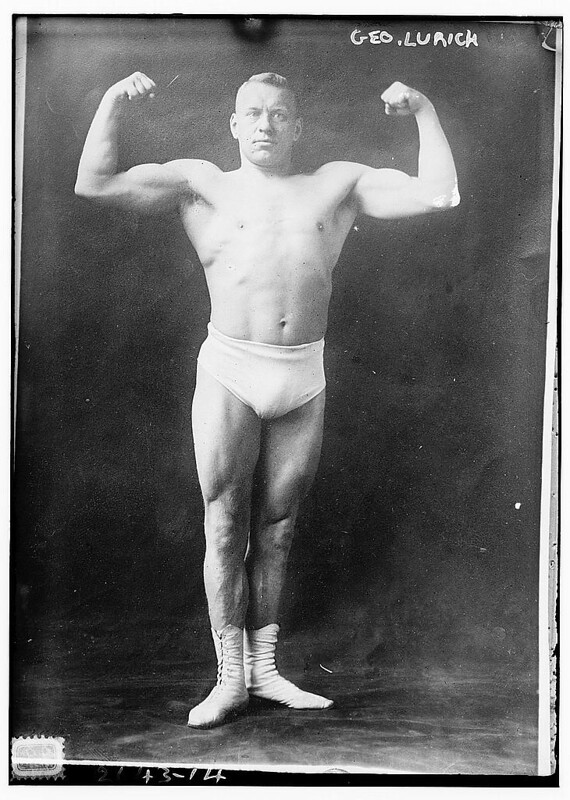THOMAS DUNBAR (8)
By:
February 20, 2023

Gertrude M. Barrows, who would later write under the pen name Francis Stevens, published “The Curious Experience of Thomas Dunbar” in The Argosy in 1904. She was nineteen; this was her first proto-sf story. It’s one of the earliest tales of a lab-created superman — and most likely the first such story by a female author. HiLoBooks is pleased to serialize it here for HILOBROW’s readers.
ALL INSTALLMENTS: 1 | 2 | 3 | 4 | 5 | 6 | 7 | 8.
“There’s nothing at all astonishing or miraculous about any of it — it’s the simple working of a law. Now listen. When we heard La Due fall (the fool had tried to walk across a plank laid over that death trap to save going round the shop — he was well repaid by the fright), I handed you the cylinder of stellarite. I did not lay it on my work-table, because that is made of aluminum, and this cylinder must not come into contact with any other metal, for the simple reason that stellarite has such an affiliation for all other metals that for it to touch one of them means absorption into it. All its separate molecules interpenetrate, or assimilate, molecules, and — stellarite ceases to have its ‘individual being.’ So I gave it to you, because I wanted my hands free, and ran down to the vats with you at my heels. I confess I would never have been so careless if I had not allowed myself to become unduly excited by a mere matter of life and death.”
He paused regretfully.
“However, to continue, you for some reason seized hold of the lever of a dynamo of very great voltage and started the armatage revolving, at the same time stepping on to the plate of its base. Now, in the ordinary course of things you would probably be at this moment lying on that couch over there — dead!”
I looked at the couch with sudden interest.
“But you are not.”
I murmured that such was indeed the case.
“No — instead of that thunderbolt burning the life out of you, like that” — he snapped his fingers melodramatically — “it passed directly through your body into the cylinder of stellarite, which, completing the circuit, sent the current back through your chest, but possessed of a new quality.”
“And that quality?”
“Ah, there you have me! What that quality was I fear it is now too late for the world ever to know. Well, you dropped the lever, and, I think, the cylinder, too, when I shouted. A moment after you seized the flywheel of the stamp machine, stopped it as if it had been the balance of a watch — and, well incidentally you saved La Due’s life.”
He ceased, the light faded out of his wrinkled face, his eyes darkened and narrowed. His head sank forward onto his chest.
“But to think of it — years — years of effort thrown away just at the moment of conquest!”
“I don’t understand,” I said, seeming to catch little glimpses of his full meaning, as through a torn veil. “Do you intend to say ——”
“I intend to say,” he snapped, with a sudden return of irritability, “that in that minute when you held the stellarite and the lever of the dynamo you absorbed enough of the life principle to vivify a herd of elephants. Why, what is strength, man? Is a muscle strong in itself? Can a mere muscle lift so much as a pin? It’s the life principle, I tell you — and I had it under my hand!”
“But this stellarite,” I protested. “You can make more, surely?”
“Make!” he scoffed. “It’s an element, I say! And it was, so far as I know, all there was in all the world!”
“Maybe it will be found yet,” I argued. “Or — if it went into the acid vat, would it have been absorbed by the metal — or what?”
“No — at the touch of that bath it would evaporate into thin air — an odorless, colorless gas. I have but one hope — that it rolled against some of the iron machinery and was absorbed. In that case I may be able to place it by the increased bulk of the assimilating metal. Well, I can but go to work again, test every particle of machinery in the vicinity of the vats — and work — and work. If I had but known before that it was electricity and animal magnetism that were needed to complete the combination — but now, it means years of patience at best.”
He shook his head dismally.
“And I?” I mused, rather to myself than to him.
“Oh — you!” he smiled, and his face ran into that tempest of wrinkles. “You can pose as Samson, if you like! Your strength is really almost limitless!”
THE END
RADIUM AGE PROTO-SF: “Radium Age” is Josh Glenn’s name for the nascent sf genre’s c. 1900–1935 era, a period which saw the discovery of radioactivity, i.e., the revelation that matter itself is constantly in movement — a fitting metaphor for the first decades of the 20th century, during which old scientific, religious, political, and social certainties were shattered. More info here.
SERIALIZED BY HILOBOOKS: James Parker’s Cocky the Fox | Annalee Newitz’s “The Great Oxygen Race” | Matthew Battles’s “Imago” | & many more original and reissued novels and stories.
